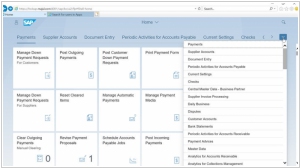Hadoop vs SAP HANA
May 26, 2023 | Author: Michael Stromann
18
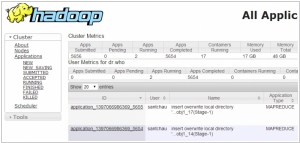
The Apache Hadoop software library is a framework that allows for the distributed processing of large data sets across clusters of computers using simple programming models. It is designed to scale up from single servers to thousands of machines, each offering local computation and storage. Rather than rely on hardware to deliver high-availability, the library itself is designed to detect and handle failures at the application layer, so delivering a highly-available service on top of a cluster of computers, each of which may be prone to failures.
See also:
Top 10 Big Data platforms
Top 10 Big Data platforms
Hadoop and SAP HANA are both powerful technologies used for big data processing and analytics, but they have significant differences in terms of their architecture, data processing capabilities, and use cases.
Hadoop is an open-source framework designed for distributed storage and processing of large datasets across clusters of commodity hardware. It uses the Hadoop Distributed File System (HDFS) for storing data and MapReduce for distributed processing. Hadoop is well-suited for handling unstructured and semi-structured data, enabling batch processing, and performing complex data transformations. It provides scalability, fault tolerance, and cost-effectiveness, making it popular for big data processing and analytics in various industries.
SAP HANA, on the other hand, is an in-memory data platform developed by SAP that offers high-performance analytics and real-time data processing. It combines a columnar database with an in-memory computing engine, allowing for rapid data retrieval and analysis. SAP HANA excels in handling structured and transactional data, offering advanced analytics capabilities, real-time insights, and integration with various SAP applications. It is widely used for real-time reporting, data warehousing, and complex analytical workloads.
The key differences between Hadoop and SAP HANA lie in their architecture, data processing capabilities, and use cases. Hadoop is designed for distributed storage and processing of large-scale data, particularly unstructured data, and excels in batch processing scenarios. It provides scalability and cost-effectiveness. SAP HANA, on the other hand, is focused on in-memory processing of structured data, offering real-time analytics and integration with SAP applications. It is best suited for scenarios requiring high-performance analytics, real-time insights, and integration with SAP ecosystem.
See also: Top 10 Big Data platforms
Hadoop is an open-source framework designed for distributed storage and processing of large datasets across clusters of commodity hardware. It uses the Hadoop Distributed File System (HDFS) for storing data and MapReduce for distributed processing. Hadoop is well-suited for handling unstructured and semi-structured data, enabling batch processing, and performing complex data transformations. It provides scalability, fault tolerance, and cost-effectiveness, making it popular for big data processing and analytics in various industries.
SAP HANA, on the other hand, is an in-memory data platform developed by SAP that offers high-performance analytics and real-time data processing. It combines a columnar database with an in-memory computing engine, allowing for rapid data retrieval and analysis. SAP HANA excels in handling structured and transactional data, offering advanced analytics capabilities, real-time insights, and integration with various SAP applications. It is widely used for real-time reporting, data warehousing, and complex analytical workloads.
The key differences between Hadoop and SAP HANA lie in their architecture, data processing capabilities, and use cases. Hadoop is designed for distributed storage and processing of large-scale data, particularly unstructured data, and excels in batch processing scenarios. It provides scalability and cost-effectiveness. SAP HANA, on the other hand, is focused on in-memory processing of structured data, offering real-time analytics and integration with SAP applications. It is best suited for scenarios requiring high-performance analytics, real-time insights, and integration with SAP ecosystem.
See also: Top 10 Big Data platforms
Hadoop vs SAP HANA in our news:
2014. MapR partners with Teradata to reach enterprise customers
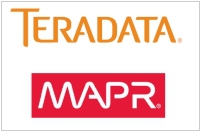
The last remaining independent Hadoop provider, MapR, and the prominent big data analytics provider, Teradata, have joined forces to collaborate on integrating their respective products and developing a unified go-to-market strategy. As part of this partnership, Teradata gains the ability to resell MapR software, professional services, and provide customer support. Essentially, Teradata will act as the primary interface for enterprises that utilize or aspire to use both technologies, serving as the representative for MapR. Previously, Teradata had established a close partnership with Hortonworks, but it now extends its collaboration and analytic market leadership to all three major Hadoop providers. Similarly, earlier this week, HP unveiled Vertica for SQL on Hadoop, enabling users to access and analyze data stored in any of the three primary Hadoop distributions—Hortonworks, MapR, and Cloudera.
2014. HP plugs the Vertica analytics platform into Hadoop
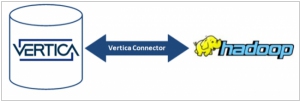
HP has unveiled the introduction of Vertica for SQL on Hadoop, a significant announcement in the world of analytics. With Vertica, customers gain the ability to access and analyze data stored in any of the three primary Hadoop distributions: Hortonworks, MapR, and Cloudera, as well as any combination thereof. Given the uncertainty surrounding the dominance of a particular Hadoop flavor, many large companies opt to utilize all three. HP stands out as one of the pioneering vendors by asserting that "any flavor of Hadoop will do," a sentiment further reinforced by its $50 million investment in Hortonworks, which currently represents the favored Hadoop flavor within HAVEn, HP's analytics stack. HP's announcement not only emphasizes the platform's interoperability but also highlights its capabilities in dealing with data stored in diverse environments such as data lakes or enterprise data hubs. With HP Vertica, organizations gain a seamless solution for exploring and harnessing the value of data stored in the Hadoop Distributed File System (HDFS). The combination of Vertica's power, speed, and scalability with Hadoop's prowess in handling extensive data sets serves as an enticing proposition, potentially motivating hesitant managers to embrace big data initiatives confidently. HP's comprehensive offering provides a compelling avenue for organizations to unlock the potential of their data, urging them to venture beyond their reservations and embrace the world of big data.
2014. Cloudera helps to manage Hadoop on Amazon cloud
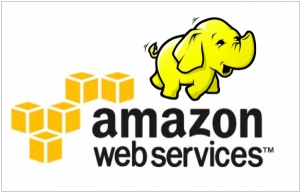
Hadoop vendor Cloudera has unveiled a new offering named Director, aimed at simplifying the management of Hadoop clusters on the Amazon Web Services (AWS) cloud. Clarke Patterson, Senior Director of Product Marketing, acknowledged the challenges faced by customers in managing Hadoop clusters while maintaining extensive capabilities. He emphasized that there is no difference between the cloud version and the on-premises version of the software. However, the Director interface has been specifically designed to be self-service, incorporating cloud-specific features like instance-tracking. This enables administrators to monitor the cost associated with each cloud instance, ensuring better cost management.
2014. SAP and IBM partner to provide SAP HANA on IBM Cloud

The software giants SAP and IBM have joined hands and announced the availability of the HANA Enterprise Cloud service, a Big Data platform, through IBM's cloud infrastructure. SAP CEO Bill McDermott acknowledged the immense demand for SAP HANA in the cloud and described the global agreement with IBM as marking a new era of cloud collaboration. IBM CEO Ginni Rometty highlighted this as a significant milestone in the deployment of enterprise cloud, emphasizing that IBM's secure, open, and hybrid enterprise cloud platform will enable SAP clients to embrace new ways of working in an era shaped by big data, mobile, and social advancements.
2014. SAP: Germany won the World Cup thanks to Big Data
In the not-too-distant past, the Oracle yacht emerged victorious in the America's Cup. Subsequently, Oracle marketers attributed this achievement to the utilization of Oracle's Big Data system. Now, it's SAP's turn (Oracle's perennial rival) to respond to this marketing claim. As it turns out, the German football team's triumph in the World Cup can also be attributed to a Big Data system called SAP Match Insights, which operates on the innovative SAP HANA technology. This system synchronized data from scouts with video footage captured on the field, enabling coaches to easily identify crucial moments during the game. By leveraging SAP Match Insights and SAP HANA, the coaches of the German National Team simplified their training methods and improved performance, thereby enhancing the beauty of the sport for fans worldwide. This story serves as a reminder of the transformative potential of Big Data for businesses.
2013. SAP makes big companies effective with Big Data. Competitors are crying
In recent years, SAP was probably the least innovative IT giant (compared to competitors Oracle, Microsoft, IBM). All SAP's own innovative projects mostly failed (remember Business ByDesign), and the only thing that SAP could do - is buying other companies (SuccessFactors, SyBase, Ariba). But at this time, SAP is going to outdo all the competitors on the wave of new trendy technology - Big Data. What is Big Data? ***

